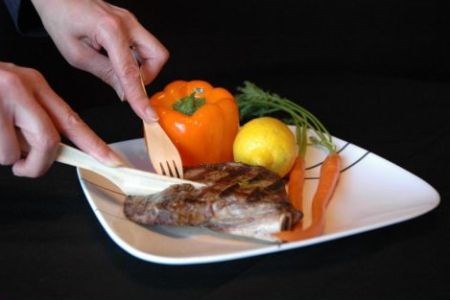Dryden is poised to open a new chapter on value-added wood.
A British Columbia cutlery company is ready to set up shop in the northwestern Ontario community if government funding comes through.
Aspenware Inc. is proposing a manufacturing plant that could employ up to 150 and have as many as six production lines making biodegradable utensils.
Company president Terry Bigsby said he’s been “patiently waiting” for a government announcement of a loan guarantee since he first landed in northwestern Ontario two years ago to start scoping out a factory site.
Bigsby, a former high school shop teacher, and his partners have a patent pending on a process for laminating and molding poplar, birch and aspen veneer into forks, knives and spoons. The Vernon, B.C. company is marketing it as a green alternative to the plastic utensils that end up in landfills every year. “We make a great value-added product. There’s nothing like it in the world.”
Aspen and birch used to be considered waste wood. For Bigsby, it is exactly what he needs to make his cutlery.
The challenge for their small 15-employee plant in British Columbia was securing fibre supply and finding support. “The B.C. Government had nothing to offer us in loan guarantees or government backing.”
Not so in this province. Bigsby likes the fact Dryden is smack dab in the middle of Canada and northwestern Ontario’s wood basket.
“Dryden has what Aspenware needs,” said Bigsby. “It’s got the people, the raw fibre product, and the capacity to do what we need to do.”
He would not disclose his timelines to start production or the price tag for the project. They intend to be a Sustainable Forest License holder to safeguard their fibre supply but will contract out the harvesting to private and First Nation woodland operators.
The plan is also to set up two or three satellite veneering facilities owned and operated by contractors in Dryden, Kenora and Ignace, thereby creating dozens of spinoff jobs.
At the outset, Aspenware would annually produce 600 million to 800 million pieces of cutlery.
Incorporated in 2003, Bigsby and his partners (father Bob Bigsby and Claus Gerlach) have been experimenting with their process since 1997. They were inspired by a German wood cutlery technology but soon realized after flying to Europe that the product was inferior. They set about tinkering with their own process beginning with a waffle iron.
The result was a small 14,000-square-foot plant in Lumby, B.C. that makes 30,000 pieces of cutlery every day and employs 15. They distribute to specialty natural and health foodstores across Canada.
Sold under the name WUN (Wood Utensils Naturally), the growth strategy involves expansion to mainstream grocery store shelves.
Bigsby believes there is a big enough North American consumer market to support production of 100 billion pieces a year.
“We really need 10 or 12 of these factories to keep up, that’s my vision. With the production capacity in Dryden, our pricing is going to be very competitive which allows us to go across all types of markets.”
Aspenware’s trail to Dryden began two years ago after a company representative spoke at a value- dded conference in Thunder Bay. Allan Willcocks, the Ministry of Natural Resources’ regional director, was impressed by their product and coaxed them to come to Ontario.
“If it all works out, kudos to him because he saw something that nobody else saw,” said Bigsby.
But Bigsby is frustrated at the pace of government approvals. The big changes in Ontario’s forest management structure has put the entire project in a holding pattern.
With new policy direction coming from a larger Ministry of Northern Development, Mines and Forestry with massive changes proposed in the forest tenure system, combined with an ongoing provincial wood supply competition, Bigsby said their loan guarantee application appears stalled.
What’s especially galling is the ministry requirement that his company lists an alternative wood supply. He has arranged for two outfits in Wisconsin to supply him with fibre as a backup and isn’t ruling out locating the cutlery plant in the United States.
“Why not, if they’re going to offer me the same thing or better? Absolutely, in a second. Made in the USA isn’t a bad thing,” said Bigsby.
Securing a loan guarantee and fibre supply will allow him to finish up his private equity capitalization for the project. “I’m sold on Dryden, if the government comes through,” he added.
Aspenware is the kind of diversification opportunity in value-added wood that Dryden economic development officer Vicki Kurz has been wanting to attract.
She has pinpointed a location for the company in an industrial park that is now under construction. The 32-acre Norwill Industrial Park is just north of the Trans-Canada Highway. The subdivision is being developed in tandem with its Centennial Business Park, which is being set aside to attract new retail tenants.
There are plans for a subdivision district heating system fueled by wood residuals from Aspenware in order to attract other complimentary value-added businesses.
“We’re waiting for Aspenware to get in and get on with things,” said Kurz. “We believe that will attract additional investments along with the energy system.”




